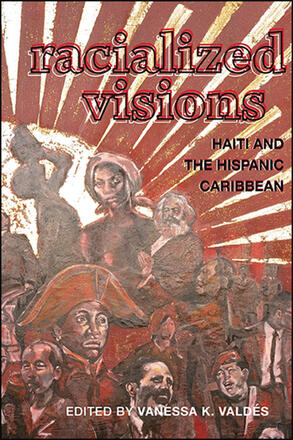
Racialized Visions
Haiti and the Hispanic Caribbean
Alternative formats available from:
The first volume in English to explore the cultural impact of Haiti on the surrounding Spanish-speaking nations of Cuba, the Dominican Republic, and Puerto Rico.
Description
As a Francophone nation, Haiti is seldom studied in conjunction with its Spanish-speaking Caribbean neighbors. Racialized Visions challenges the notion that linguistic difference has kept the populations of these countries apart, instead highlighting ongoing exchanges between their writers, artists, and thinkers. Centering Haiti in this conversation also makes explicit the role that race—and, more specifically, anti-blackness—has played both in the region and in academic studies of it. Following the Revolution and Independence in 1804, Haiti was conflated with blackness. Spanish colonial powers used racist representations of Haiti to threaten their holdings in the Atlantic Ocean. In the years since, white elites in Cuba, the Dominican Republic, and Puerto Rico upheld Haiti as a symbol of barbarism and savagery. Racialized Visions powerfully refutes this symbolism. Across twelve essays, contributors demonstrate how cultural producers in these countries have resignified Haiti to mean liberation. An introduction and conclusion by the editor, Vanessa K. Valdés, as well as foreword by Myriam J. A. Chancy, provide valuable historical context and an overview of Afro-Latinx studies and its futures.
Vanessa K. Valdés is Director of the Black Studies Program and Professor of Spanish and Portuguese at the City College of New York, City University of New York. Her books include Diasporic Blackness: The Life and Times of Arturo Alfonso Schomburg, also published by SUNY Press.
Reviews
"One of the most powerful elements of Vanessa K. Valdés' scholarship is the incisive comparative lens she deploys, one which reimagines the Black literary and cultural geographies of the Americas … Taken together, all the chapters launch a profound critique of anti-Haitian discourse that emerges within the colonial production of global anti-Black racism. Valdés structures the collection in a way that opens with the broad problem of Haitian exclusion and ends with pedagogical insights on the border." — ariel: A Review of International English Literature
"Once again, Vanessa K. Valdés has proven herself a leader in Afro-Latin American and Latinx studies in this bound volume of essays on Haiti in the Hispanic Caribbean … This interdisciplinary work will appeal to scholars of contemporary literature and culture, history, and the eighteenth and nineteenth centuries. Teachers of undergraduate and graduate Spanish, Latin American Studies, and French authors can use the extensive bibliography and profound arguments of these authors, along with Accilien's model syllabus, to intervene in the racialized visions of Hispaniola." — Hispania
"Racialized Visions is valuable for the discussion of the future of blackness across the Americas and the framing of history through certain positionalities. As Black writers have and continue to stress the importance of speaking, reading, and engaging our subject matters across disciplines and across languages to add new significance and acknowledge the contradiction in power, politics, and history, this book is an example of creating necessary dialogue … Through her dialogue with transnational writers Professor Valdés pushes forward the effort to put Haiti in conversations that they were traditionally left out of, this expands Afro-Latinidad and Blackness in Latin America as more than just a sub-field." — E3W Review of Books
"An essential intervention, Racialized Visions offers new optics to reading and studying Haiti in conversation with the Dominican Republic, Cuba, and Puerto Rico. These essays not only point to otherwise overlooked moments of solidarity and sociality across time and place, but also underscore the pedagogical and academic labor required to think through these relationships outside of their constructed differences. In doing this labor, Racialized Visions intimately connects shared traumas and memories of Haiti and the Hispanic Caribbean and navigates their mutual histories that bring these people together. Taking a new look at the literary production of this sector of the Caribbean continuum, this work brings revitalizing importance to the memory of the Haitian Revolution and the ripples and vibrations of Black liberation that have been felt since." — Chasqui
"Racialized Visions analyzes a variety of literary works but also political diplomacy, monuments, and other discourses, in a tightly organized and energetic volume that offers a well-developed, and vital, theme: systematic analyses of the meaning of Haiti in the Spanish-speaking Caribbean. The book coheres wonderfully around this motif and offers many entrées into the question of the significance of Haiti." — Anne Eller, author of We Dream Together: Dominican Independence, Haiti, and the Fight for Caribbean Freedom
"This is a timely, well-conceived, and important contribution to the growing efforts by scholars, activists, and artists in the United States to think across and work through disciplinary, linguistic, and historical boundaries that have traditionally separated the study of Haiti from the rest of the Caribbean, particularly the Spanish-speaking Caribbean." — April J. Mayes, author of The Mulatto Republic: Class, Race, and Dominican National Identity